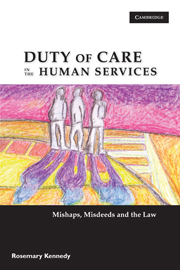Book contents
- Frontmatter
- Dedication
- Contents
- Acknowledgements
- Author's note
- Part 1 Positioning and mapping the territory of human service mishaps and misdeeds
- Part 2 Mishaps and misdeeds through a law lens
- Part 3 Mishaps and misdeeds through a human services lens
- Chapter 9 Service delivery – screening, assessment and planning
- Chapter 10 Service delivery – implementation and closure
- Chapter 11 Information and records management
- Chapter 12 Relationships, rifts and reactions
- Part 4 Mishaps and misdeeds through a unified lens
- Appendix: Finding the law and cases
- References
- Index
Chapter 10 - Service delivery – implementation and closure
from Part 3 - Mishaps and misdeeds through a human services lens
Published online by Cambridge University Press: 05 June 2012
- Frontmatter
- Dedication
- Contents
- Acknowledgements
- Author's note
- Part 1 Positioning and mapping the territory of human service mishaps and misdeeds
- Part 2 Mishaps and misdeeds through a law lens
- Part 3 Mishaps and misdeeds through a human services lens
- Chapter 9 Service delivery – screening, assessment and planning
- Chapter 10 Service delivery – implementation and closure
- Chapter 11 Information and records management
- Chapter 12 Relationships, rifts and reactions
- Part 4 Mishaps and misdeeds through a unified lens
- Appendix: Finding the law and cases
- References
- Index
Summary
IN THE SERVICE DELIVERY phases of human services activity with clients, ideally plans are implemented, monitored, adjusted, and finally the service relationship is brought to closure at a mutually agreed or known point. However, all of the deficits that can increase legal liability during the screening and assessment stages are equally pertinent.
The intervention and closure phases have intrinsic characteristics that generate their own particular legal risks or accentuate some already canvassed. First, intervention indicates that something is to be done and this in turn requires decisions about the nature of that activity. There is nothing definitive about appropriate types and applications of intervention models, therapies and techniques in the human services, and this can give rise to a range of legal risks. Second, although all human services activities require informed consent, the intervention and data management decisions that accompany these activities are underpinned by consent questions. The law has definite positions on informed consent that demand attention in practice. Third, sensitivity to diversity is another matter that needs to be considered in circumstances of ongoing relationships and service delivery. Fourth, during intervention in particular, although not uniquely, workers and clients can be engaged in intimate and private activity which generates ‘unrealistic and strong emotions and reactions’ (Houston-Vega et al. 1997 p. 63) on both sides. In this environment, role conflicts and boundary violations with legal implications are not unexpected.
- Type
- Chapter
- Information
- Duty of Care in the Human ServicesMishaps, Misdeeds and the Law, pp. 185 - 207Publisher: Cambridge University PressPrint publication year: 2009



